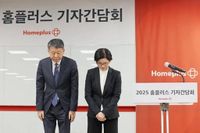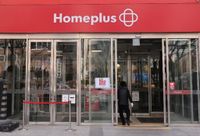The Fair Trade Commission (FTC) of South Korea has embarked on a significant investigation concerning allegations of unfair internal trading involving MBK Partners, Homeplus, and Lotte Card. This development comes as the regulatory body sent investigators to the headquarters of each company on March 25, 2025, to conduct a thorough examination of the claims.
At the heart of this inquiry is whether Lotte Card, a subsidiary of MBK Partners, provided preferential conditions to Homeplus pertaining to corporate card transactions. Initial reports suggest that the commission is scrutinizing the terms under which corporate card limits and fees were issued to ensure no unfair advantages were granted relative to other market competitors.
MBK Partners holds substantial ownership stakes in both Homeplus — where it maintains a 100% share — and Lotte Card, with a 59.83% stake. The interrelated ownership has spurred concerns regarding potential conflicts of interest and the integrity of financial dealings across the companies.
Additionally, the FTC is delving into claims that Homeplus has been disbursing excessive dividend payments to MBK Partners, labeling these transactions as potentially unjustifiable internal trading practices. The concern is amplified by the size of the payments in question. Reports indicate that Homeplus has annually remitted over 1 trillion won to a special-purpose company (SPC) named Korea Retail Investment, which was established specifically by MBK to manage its acquisition of Homeplus, and which also involves considerable funding connected to redeemable convertible preferred shares (RCPS) issued by Homeplus.
In 2015, MBK Partners acquired Homeplus for a staggering 7.2 trillion won, with 5 trillion won of that amount financed through loans secured under Homeplus’s name. Approximately 700 billion won of that financing is directly linked to the RCPS. The financial structure surrounding this deal has been brought into question, with some lawmakers alleging that the issuance and payment of these shares could represent channels for MBK to inappropriately siphon funds from Homeplus.
During a debate in the National Assembly on March 18, 2025, representative Kang Min-kuk highlighted these issues, bringing to the forefront inquiries into why Korea Retail Investment was reportedly receiving substantial interest expenses from Homeplus, thereby suggesting a scenario of unfair internal trading. Kang posed pointed questions to Han Ki-jeong, the chair of the FTC, urging the commission to investigate potential violations of fair trade laws vigorously.
The FTC's investigation is a crucial step towards ensuring transparency and accountability in corporate governance within the South Korean retail sector. The commission has been firm in its stance, stating through an official representative that it will impose strict penalties should any violations of fair competition laws be substantiated.
As the inquiry develops, MBK Partners has firmly denied the allegations of unfair trading, asserting that their dividend receipts have been greatly misrepresented. The company argues that the annual dividend payments have been considerably less than claimed — approximating only 270 billion won per year, which accounts for about 2-3% of the total involved, a stark contrast from the figures suggested in the allegations.
These assertions raise broader questions regarding the mechanisms of corporate financing and the relationships between affiliated companies. Reports indicate that the proper governance frameworks and checks and balances must be evaluated, particularly in conglomerates where complex interdependencies can lead to situations ripe for conflict and regulatory concern.
Furthermore, the probe also touches upon other potential improprieties related to the 2015 acquisition of Homeplus from British retailer Tesco. Allegations have surfaced suggesting that Homeplus may have covered legal expenses arising from litigation related to this acquisition on behalf of MBK Partners, further complicating the ethical landscape of these corporate relationships.
In an era where corporate accountability is under intense scrutiny, the outcomes of the FTC's investigation could serve as a bellwether for the treatment of ownership structures and internal dealings in South Korea's corporate environment. Stakeholders are keenly awaiting the findings, which may well set precedents for future governance frameworks across the business landscape.
Experts underline the importance of regulatory compliance and caution against overlooking the nuances involved in internal corporate transactions. They emphasize that a rigorous examination of both practices and policies is necessary to safeguard shareholder interests and public trust in the market.
As the situation unfolds, industry observers will be watching closely to see how MBK Partners, Homeplus, and Lotte Card navigate these challenges, and what impact this inquiry will have on their operations moving forward. Given the high stakes involved, the investigation's implications may resonate well beyond the immediate parties involved, influencing regulatory practices and corporate governance norms in South Korea.
With legal and financial experts weighing in, the call for transparency and accountability could reshape the corporate landscape, prompting a reevaluation of how similar entities manage their internal trading practices. The final verdict on these allegations remains to be seen, but for now, the spotlight is firmly on MBK, Homeplus, and Lotte Card as they face scrutiny from regulators.



